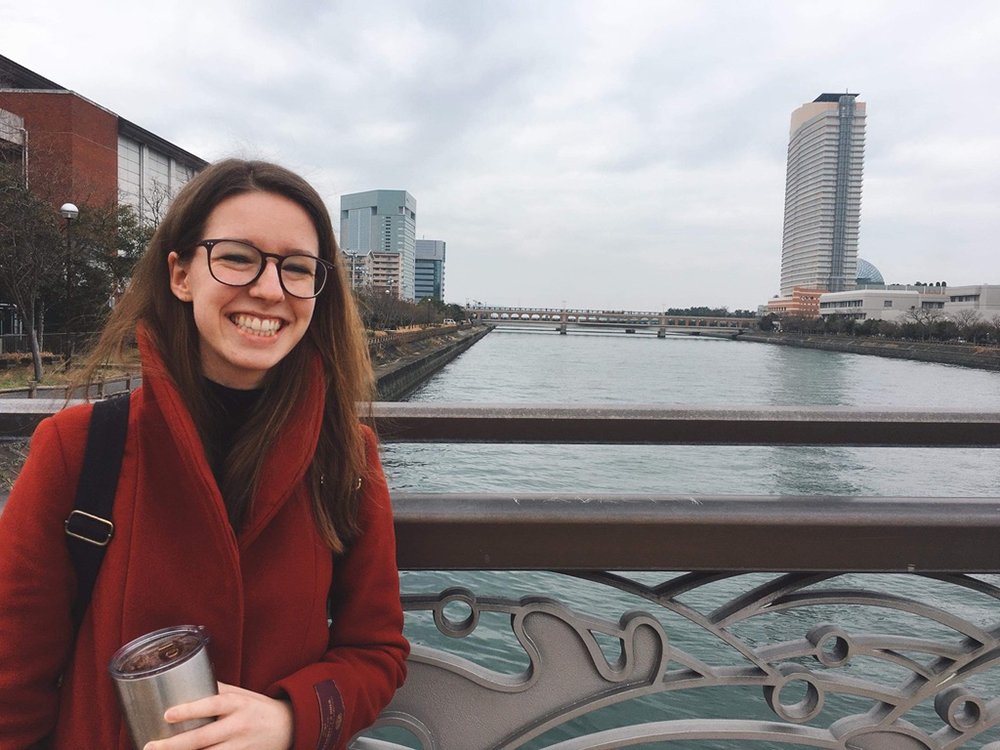Convocation ‘20: Sarah Clifford
Donna McKinnon - 2 June 2020

Although she describes herself as a “careful planner”, Sarah Clifford learned to embrace change throughout her undergraduate program at the University of Alberta, exhibiting the flexibility to pursue her developing interests wherever they led and the curiosity to go after educational and leadership opportunities beyond the classroom.
Enrolled as a history student in her first year, Sarah realized that the honors program in political science captured her research interests more directly, and so she switched disciplines and found an academic framework that would allow her to “critically question the world” around her.
Hailing from a hamlet in rural Alberta, Sarah looked for ways to broaden her experiences as an undergraduate, taking advantage of the various extracurricular activities available to her and utilizing these opportunities to their maximum capacity. This included summer study abroad trips to Cuba, China, Ireland and Russia, and participation in local and international student events. She also took on leadership roles with the U of A Model United Nations (including sessions at the UN Headquarters in New York) and the Political Science Undergraduate Review, among other roles.
Sarah’s personal and academic journey is only beginning. As she heads to Denmark this fall to pursue a graduate degree in political science, one suspects wherever it leads her, the experience will be extraordinary.
What drew you to the area of your study?
Upon entering university, my passion was for 20th-century American and European history. Following these interests, I enrolled in a Bachelor of Arts degree, majoring in history, with the hope of becoming a social studies teacher. However, as I progressed in my degree, I soon concluded that my interests did not fall within the purview of a “history” degree but instead, sat at the nexus of the study of international relations, memory, and gender studies. These intersecting interests are why I developed such a passion for political science. In essence, political science allowed me to be unconstrained by my research interests. Whether I was analyzing the gendering of foreign policy or the politics of history textbooks, political science taught me how to critically question the world around me and how to deconstruct the many structures of power that pervade our society.
What is the most remarkable thing you learned while you were a student?
I think that the most remarkable thing anyone can learn during university is simply more about yourself. For me at least, university was a time of liberation and independence – a figurative opportunity to reformulate my interests, discover my talents, and surround myself with like-minded and driven people. Nonetheless, to extract one moment from the entirety of my experience at the U of A proves difficult because learning is a process that cannot be isolated to one singular incident. Instead, what I take away from this degree is the journey of developing my identity and refining my interests.
Did you face any significant challenges, and if so, how did you deal with it?
Like many students at the U of A, the most significant challenge I faced revolved around my mental health. As I progressed further into my degree, the pressure to excel in my studies while simultaneously gaining valuable work, research, and volunteer experience to bolster my chances of entering grad school took an increasingly heavy toll on both my mental and physical well-being. To say that I successfully combated or learned how to “deal with” the university’s burnout culture is incorrect. At times, I found myself with full course loads, working 2-3 jobs, and volunteering with multiple organizations simply to add to my CV. These choices rarely allowed me to develop any type of social life outside of the inner workings of the U of A and only helped contribute to my mental exhaustion. As these challenges lay in the make-up of university culture itself, I never could understand or “deal” with my mental health until the last year of my degree, and hence never overcame or solved these challenges.
How did you manage the challenges of navigating student life under COVID-19 restrictions and remote learning?
“Manage” is a difficult term to use to define how I coped under the COVID-19 restrictions as it denotes a sense of autonomy and agency in the matter – agency I felt I did not have. I found adjusting to social distancing and remote learning an extremely lonely, anxiety-driven, and vulnerable experience. That being said, I was fortunate to have a phenomenal support group that consisted of friends, family, and professors from the Political Science department who
cumulatively helped ease the stress of transitioning to remove learning and social distancing.
What piece of advice do you wish someone had given you when you started?
Be open to change. I entered university with my life laid out in front of me. These plans lasted approximately one year. Since then, I changed my major three times, my minor three times as well, and even dared to completely alter my thesis topic seven months behind schedule. I have also revised my career plans more times than I care to acknowledge and now recognize that this will continue to occur in the future. This is to say that, for someone who is a careful planner, stubborn, and disdainful of change like myself, change is inevitable and something that students should relish in university.
What is next for you?
Currently, I am a research assistant for both the Faculty of Education and the China Institute on campus. Pending the pandemic, I will attend the University of Copenhagen’s MSc in Political Science this fall. I hope to carry on my current research that analyzes the intersections of masculinit(ies), national identity, and foreign policy, through the lens of American high school history textbooks.
The Future is Arts! This story is part of a series celebrating our graduates. Please join us for a virtual convocation, Friday, June 12, at 10 a.m. MST. at ualberta.ca. Registration is not required.